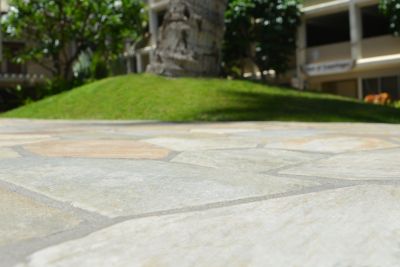Leading Products For Stone Masonry Restorations Professionals
Explore top-rated tools and materials essential for restoring and preserving stone masonry with precision and durability.
 Restoring stone masonry requires a careful selection of products that can effectively address the unique challenges presented by historic and structural stonework. Whether working on a small repair or a large-scale restoration, the right materials and tools are essential for achieving durable and aesthetically pleasing results. These products include specialized mortars, sealants, cleaning agents, and repair compounds designed to match the physical and chemical properties of natural stone. Proper application and compatibility are crucial to prevent further deterioration and to preserve the integrity of the original masonry.
Restoring stone masonry requires a careful selection of products that can effectively address the unique challenges presented by historic and structural stonework. Whether working on a small repair or a large-scale restoration, the right materials and tools are essential for achieving durable and aesthetically pleasing results. These products include specialized mortars, sealants, cleaning agents, and repair compounds designed to match the physical and chemical properties of natural stone. Proper application and compatibility are crucial to prevent further deterioration and to preserve the integrity of the original masonry.
Top Overall Option
Multi-Purpose Masonry Repair Compound
A versatile repair compound formulated for various stone types and restoration needs, offering good adhesion, flexibility, and ease of application. It is suitable for filling cracks, rebuilding sections, and bonding new material to existing stone surfaces, making it an adaptable choice for many restoration projects.
Types of Products For Stone Masonry Restorations
Hydraulic Lime Mortar
A breathable and flexible mortar ideal for historic stone repairs, compatible with traditional masonry techniques.
Natural Stone Sealant
A penetrating sealant designed to protect stone surfaces from moisture while maintaining breathability.
Stone Cleaning Gel
A gentle yet effective cleaning gel suitable for removing dirt and biological growth without damaging the stone.
Epoxy Stone Repair Resin
A high-strength resin used for filling cracks and rebuilding damaged stone sections with excellent adhesion.
Polymer-Based Repointing Mortar
A flexible mortar for repointing joints, providing durability and compatibility with existing masonry.
Hydrophobic Stone Protector
A water-repellent treatment that helps prevent moisture penetration and staining.
Consolidant for Stone
A consolidant that penetrates and stabilizes friable or weakened stone surfaces.
Biological Growth Remover
A specialized solution for removing moss, algae, and lichens from stone surfaces safely.
Flexible Repair Putty
A pliable putty suitable for filling irregular cracks and small holes in stone surfaces.
High-Performance Mortar Mix
A durable mortar mix designed for structural repairs and repointing with excellent adhesion.
Acid-Free Cleaning Solution
A neutral cleaning agent that removes stains and deposits without damaging the stone.
Crack Injection Resin
A low-viscosity resin used to inject into cracks for stabilization and sealing.
Stone Surface Polish
A polishing product to enhance the appearance of finished stone surfaces while providing some protection.
Weatherproofing Coating
A coating designed to shield stone surfaces from environmental damage and weathering.
Pointing Trowel and Tools
Specialized tools for applying and finishing mortar and repair compounds precisely.
Popular Choices
Widely used for historic restoration projects due to its compatibility and breathability.
Commonly chosen for gentle cleaning of delicate stone surfaces.
Popular for its strong adhesion and ability to restore structural integrity.
Frequently used for restoring joints and preventing water ingress.
Chosen for protecting stone from moisture damage while allowing vapor transmission.
Popular for maintaining aesthetic appearance by removing biological buildup.
Valued for filling small cracks and surface imperfections flexibly.
Often used to stabilize weakened or friable stone surfaces.
Selected for sealing and stabilizing cracks in structural masonry.
Popular for protecting stone facades from environmental wear.
Commonly used for structural repairs requiring durable bonding.
Preferred for cleaning without risking damage to sensitive stone surfaces.
Selecting appropriate restoration products involves understanding the specific type of stone, the extent of damage, and the environmental conditions the masonry is exposed to. For example, softer stones like limestone and sandstone may require gentler cleaning agents and flexible repair mortars, while harder stones like granite might demand more robust solutions. Additionally, considerations such as breathability, adhesion, and compatibility with existing materials influence product choice. Using the correct products can help maintain the stone's natural appearance and structural stability over time.
Restoration projects often involve multiple stages, starting with cleaning to remove dirt, biological growth, or previous repair materials. Following cleaning, repairs may involve filling cracks, rebuilding missing sections, or repointing joints with suitable mortars. Protective sealants can then be applied to safeguard the restored masonry from moisture intrusion and environmental damage. Each stage benefits from specialized products formulated for the task, ensuring the longevity and preservation of historic or decorative stonework. Proper tools and techniques, combined with high-quality products, can significantly enhance the success of any masonry restoration effort.
Key Buying Considerations
- Compatibility with the type of stone being restored to prevent damage.
- Breathability of the product to allow moisture vapor to escape from the stone.
- The flexibility of repair compounds to accommodate slight movements or thermal expansion.
- Ease of application, including working time and curing conditions.
- Durability and resistance to environmental factors such as moisture, temperature changes, and biological growth.
- Color matching options or neutral formulations for seamless repairs.
- The product’s ability to adhere to the existing stone surface without additional priming.
- Safety and handling requirements, including toxicity and ventilation needs.
- Compatibility with other restoration products used in the project.
- Cost and availability, ensuring the product fits within project budgets and timelines.
- Environmental conditions during application, such as temperature and humidity.
- Long-term performance and maintenance requirements post-restoration.
- The product’s capacity to preserve the aesthetic and historic integrity of the stone.
- Availability of technical support or guidance from suppliers.
This content may contain affiliate links. We earn commissions to support our work, at no additional cost to you.
